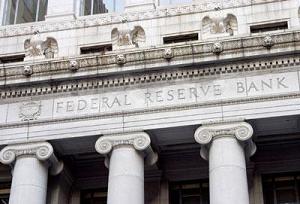The Fed Must Be Audited: The Fraudulent Practices of the Federal Reserve

In March 2004, when Alan Greenspan was Fed chairman, he suppressed the opinions of those Fed officials who knew that there was a housing bubble.
Congressman Alan Grayson points out that – because the Fed unilaterally decided to hand out half a trillion to foreigners without any Congressional oversight, and that Bernanke testified that he didn’t know who got the loot – the Fed must be subject to an audit.
Yves Smith and Tom Adams – in analyzing the Fed’s lack of full disclosures regarding its extraordinary rescue operations – conclude:
Even a cursory inspection of the Fed’s disclosures of its extraordinary rescue operations shows them to have been made only under duress, and then to be incomplete and deliberately unhelpful.
The reason this matters, is that, contrary to the Fed’s claims of independence, it has been operating as an extra-legal off balance sheet entity of the Treasury, ircumventing normal Constitutionally-stipulated budget processes. And rather than make adjustments in its practices to reflect its enlarged and now overtly political role, the Fed has instead been engaging in cynical, blatant misrepresentation, giving lip service to the idea of greater transparency in pubic, while fighting disclosure tooth and nail.
Since the Fed has entered into an openly political stance (and this dates back to Greenspan) and cannot be relied upon to make truthful and complete disclosures, the only recourse is to put it on a much shorter leash, which includes greater scrutiny, including third party validation. The Fed has brought on the audit demands via the unabashed and repeated abuse of its privileged role.
***
The Fed seems awfully keen to steer clear of the fate that befell Lehman. Lehman was grossly and verifiably misvaluing some investments, namely Archstone and SunCal, that confirmed doubts about the veracity of its accounting. If you can’t check any particular valuations, it’s a lot harder to ask difficult questions. And unlike Lehman, the Fed can continue to account to no one.
The Fed is engaging in same practices that caused the crisis: failure to make timely disclosures, obfuscation, use of off balance sheet vehicles to distance itself from losses. This posture alone should disqualify the central bank from assuming a greater regulatory role.
The Fed and Treasury’s three card monte operation is anti-democratic and possibly illegal, and to add insult to injury, voters are treated as if they have no right to know when they are ultimately footing the bill. The Fed’s persistent stonewalling and deep seated hostility toward the public provide ample proof of the need for an audit.
The Fed argues that an audit would interfere with its monetary policy decisions. That is incorrect for at least two reasons.
Initially, the bills to audit the Fed specifically provide that no outside agency will interfere with the Fed’s monetary policy decisions.
More importantly, decisions about what toxic assets should be accepted by the Fed as collateral, how such assets should be valued, and who bailout funds should be given to are wholly separate from the Fed’s core monetary policy decision: raising or lowering interest rates.
Adjustment of interest rates has been the primary lever the Fed has applied to the economy since it’s formation in 1913.
The Fed has also recently started using a radical new tool: replacing the money multiplier with interest payments for excess reserves deposited with the Fed. Personally, I strongly disagree with this as a policy tool because I believe that – in the name of preventing inflation – the Fed is guaranteeing prolonged deflation and the lack of a sustainable recovery. However, this is arguably an exercise of core monetary policy by the Fed.
But funneling hundreds of billions to foreign nations and foreign banks, accepting worthless junk from the too big to fails and marking it at unrealistic valuations, and doing the other things which the Fed has been doing recently are not core monetary functions. Congress never authorized these actions when they passed the Federal Reserve Act.
Therefore, the Fed’se actions must be made transparent and subject to the light of day.

